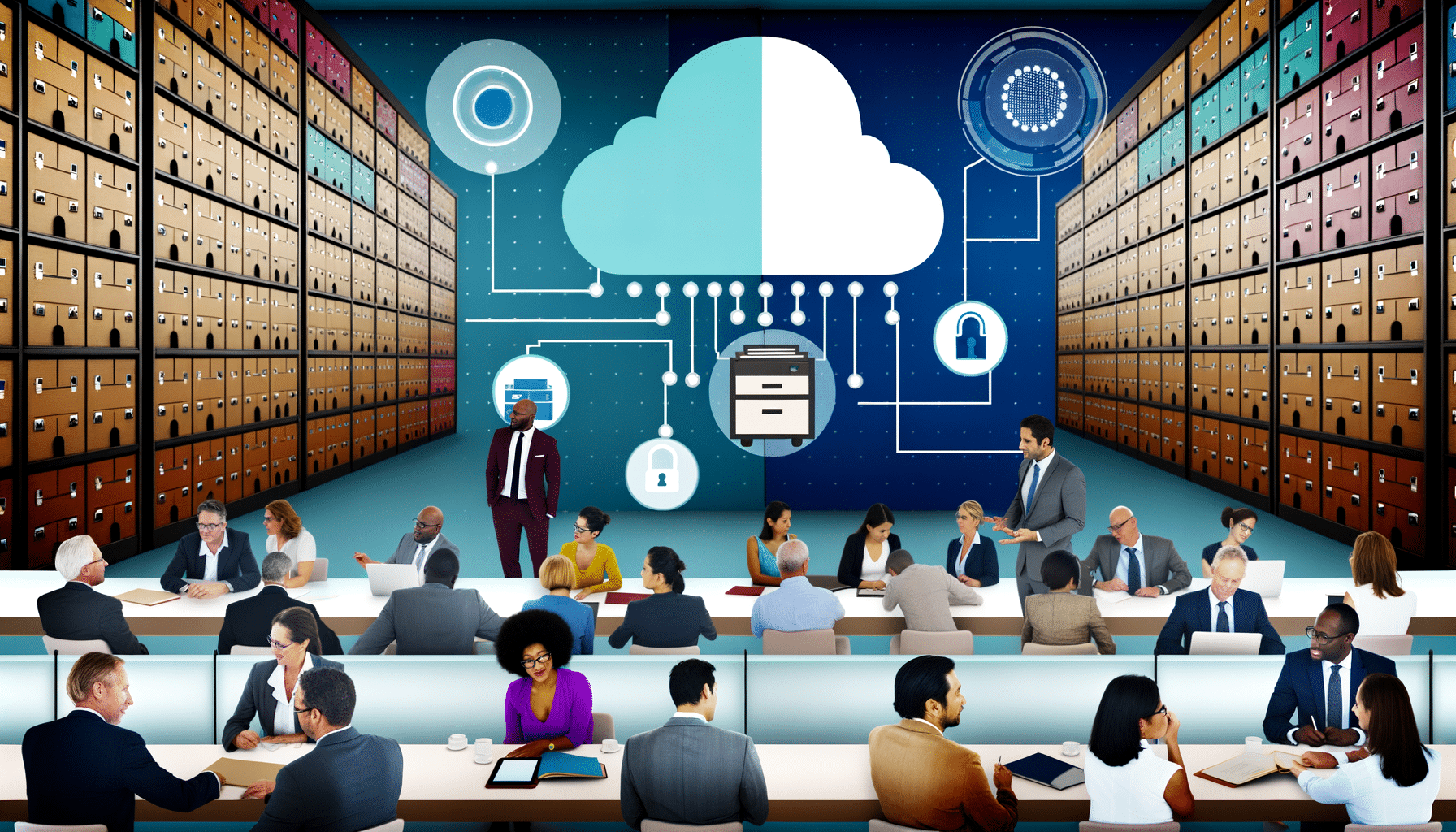- Cloud Solutions
- June 2, 2024
Key Considerations for Migrating Government Records to the Cloud

Understanding the Challenges and Opportunities in Cloud Migration for Government Records
As someone who’s walked the corridors of innovation and technology with RecordsKeeper.AI, I’ve seen first-hand the paradigm shifts in data management—especially for government entities. The shift towards cloud technology is no longer a futuristic concept but a present necessity. Cloud migration of government records presents incredible opportunities but comes with a unique set of challenges that require careful planning and expert execution.
Recognizing the Significance of Cloud Migration
Cloud migration isn’t just a buzzword—it’s a powerful solution driving significant benefits in terms of accessibility, scalability, and cost-efficiency. Shifting government records to the cloud can revolutionize how agencies operate, making data more readily available for decision-making while ensuring a flexible infrastructure that can grow with public demands.
Although cloud solutions offer attractive benefits, it’s essential to assess the specific requirements and challenges faced by government departments. The sensitive nature of government records demands a strategy that protects confidentiality, ensures compliance, and maintains the integrity of data.
Evaluating Key Challenges in Migrating Government Records
Government agencies often manage colossal amounts of sensitive data. Migration to the cloud involves a series of challenges, such as:
- Data Security: Ensuring data confidentiality and protection against breaches is crucial, especially with records holding personal and classified information.
- Compliance Regulations: Adhering to legal frameworks like GDPR, HIPAA, or local regulations is paramount. Any migration strategy must consider these frameworks to avoid compliance risks.
- Legacy Systems: Older infrastructure can pose integration issues. Deciding which data can be migrated and which systems require modernization is essential.
- Cost Management: Evaluating costs for cloud infrastructure against budgets, alongside long-term savings and efficiency, is necessary for stakeholder buy-in.
- Vendor Lock-in: Avoiding dependency on a single cloud provider by employing a hybrid or multicloud strategy can mitigate risks.
Implementing Best Practices for a Seamless Cloud Migration
To effectively navigate these challenges, here are some best practices that have proven invaluable:
- Conduct a Comprehensive Assessment: Begin with a thorough analysis of current systems. Understand the data scale, sensitivity, and technical constraints to shape a tailored migration plan.
- Develop a Clear Migration Strategy: Outline a strategic roadmap that includes timelines, resource allocation, and risk management protocols. Consider a phased approach to minimize disruptions.
- Prioritize Data Security: Implement a robust security framework with encryption, role-based access controls, and constant monitoring to safeguard sensitive information.
- Engage with Experts: Partner with cloud migration experts who understand government-specific needs and can guide you through compliance, technical challenges, and execution.
- Train and Communicate: Ensure that staff is adequately trained to use cloud systems effectively. Clear communication minimizes resistance and promotes a culture of acceptance.
Federal Regulations and Cloud Compliance
Compliance isn’t merely about ticking boxes. It’s integral to building trust and ensuring the integrity of government data. At RecordsKeeper.AI, we’ve built tools to automate compliance processes, so agencies can focus more on governance and less on paperwork. Seamlessly integrating compliance into cloud operations not only protects against legal repercussions but also enhances public confidence in government operations.
The Role of Blockchain in Enhancing Cloud Migration
An intriguing aspect of cloud integration is the role of blockchain technology. Blockchain offers an additional layer of security and transparency for government records, ensuring that data is immutable and verifiable. By incorporating blockchain, RecordsKeeper.AI provides solutions that help government entities assure constituents that data has not been tampered with, supporting both transparency and trust.
Conclusion: Steering Towards a Frontier of Innovation
As we stand on the brink of a digital transformation frontier, cloud migration of government records symbolizes more than a technological shift—it’s about reimagining how governance can operate securely and efficiently. The journey is complex but ultimately rewarding, unlocking new possibilities for transparency, efficiency, and public trust.
I invite you to further explore how RecordsKeeper.AI can ease this transition through our expertly designed solutions. Stay connected with me for more insights into how technology can simplify complexities and open new avenues for progression.
Toshendra Sharma is the visionary founder and CEO of RecordsKeeper.AI, spearheading the fusion of AI and blockchain to redefine enterprise record management. With a groundbreaking approach to solving complex business challenges, Toshendra combines deep expertise in blockchain and artificial intelligence with an acute understanding of enterprise compliance and security needs.
Related Posts

Leveraging Cloud Storage for Legal Documentation
Discover the benefits of using cloud storage for secure and accessible legal documentation.
- September 1, 2024

Leveraging Cloud Solutions for Government Record Keeping
Explore the benefits and challenges of cloud solutions for public sector records.
- May 5, 2024
Archives
- December 2024
- November 2024
- October 2024
- September 2024
- August 2024
- July 2024
- June 2024
- May 2024
- April 2024
- March 2024
- February 2024
- January 2024
- December 2023
- November 2023
- October 2023
- September 2023
- August 2023
- July 2023
- June 2023
- May 2023
- April 2023
- March 2023
- February 2023
- January 2023
- December 2022
- November 2022
- October 2022
- September 2022
- March 2019
Want to get more content like this?
Signup to directly get this type of content to your inbox!!
Latest Post
Organizing External Auditor Access
- December 22, 2024
Document Control in Manufacturing Plants
- December 21, 2024
Handling Rush Financial Report Requests
- December 20, 2024
Managing Record Access After Staff Changes
- December 19, 2024





